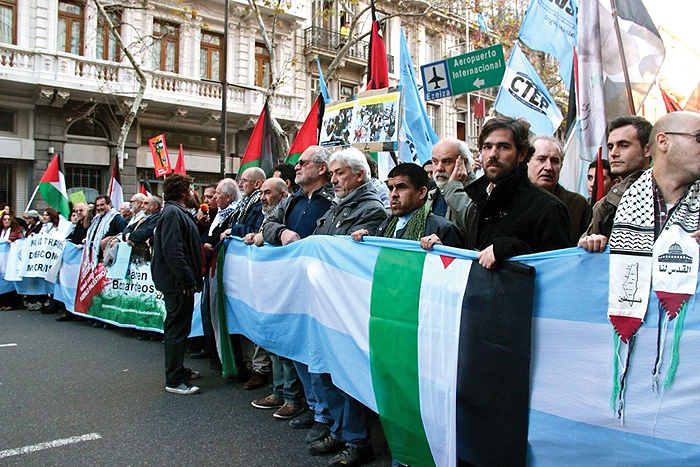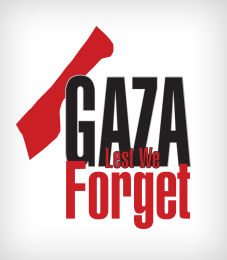The images of thousands of people waving Palestinian flags and calling for an end to the Israeli aggression against Gaza were of great importance for our people in Palestine; let alone the decision taken by several Latin American governments to take concrete action, including recalling their diplomats from Tel Aviv. Saeb Erekat would say that Latin America is the “moral reserve of the international community,” just as many would repeat that “Latin Americans are closer to us than the Arabs,” but very few would understand why. Here are some tips that might be helpful as well as some challenges for Palestine in the Latin American region.
Latin America and Palestine have known
each other for over 100 years
By the end of the Ottoman Empire in Palestine, and its catastrophic economic situation, groups of Palestinians began to immigrate to Latin America, establishing prominent communities in countries such as Chile, Peru, Bolivia, Ecuador, and Honduras. Later, Palestinian immigrants would reach the shores of Brazil, El Salvador, Guatemala, and even Argentina and Uruguay. After more than 100 years of immigration, Palestinians are an integral part of Latin American societies and have taken their place as prominent politicians, artists, businessmen, clergy, and sportspeople, among other professions. The Palestino Football Club in Chile is one of the most prominent examples of Palestinian integration in Latin American societies.
Relations between the PLO and Latin American
left-wing movements
During the late sixties and early seventies, Latin Americans in exile, victims of their dictatorships, met Palestinians in Europe and Cuba, where the revolutionary regime had already offered scholarships to Palestinian students. Groups such as Fatah and the PFLP would establish strong relations with various revolutionary groups in Latin America. President Yasser Arafat himself would dedicate enormous efforts to reaching out to the leaders of such movements. Palestinian combatants supported the Sandinistas in Nicaragua against the pro-American dictatorship, and many Latin American freedom fighters would be trained by the PLO in Lebanon. Some of them or their movements, 35 years later, would be in power in Brazil, Argentina, Uruguay, and Chile. Chilean president Michelle Bachelet would say that during the exile in Germany, she learnt symbolically from a Palestinian how to say “refugee” in German. While Israel was cooperating with the military juntas, including training in torture techniques, the PLO was technically, and even financially, supporting the Latin American resistance groups.
PLO links in Palestinian communities
Several envoys were sent during the seventies and eighties to work and coordinate the work of Palestinian communities in Latin America. This integration, consolidated with the inclusion of representatives from Chile, Brazil, Peru, Colombia, Venezuela, and Honduras in the Palestine National Council (PNC), included a great level of interaction between the Palestinian leadership and its communities. Special envoys to work with the communities, the opening of the first diplomatic missions to the region in Cuba, Mexico, and Brazil, as well as the visits conducted by PLO symbols such as Yasser Arafat (Cuba, Nicaragua, and Colombia), Faruk Kaddoumi, Khaled Hassan, Fr. Ibrahim Ayyad, Intissar Al Wassir, Bishop Hilarion Capucci, and Mahmoud Darwish, would boost the relations between the communities in Latin America and Palestine.
Civil society activism
Social media has provided Palestine with an excellent opportunity to network with its diaspora and with solidarity movements. Many civil society initiatives, from health care to Palestinian children to the BDS movements, have penetrated into various Latin American circles, attracting new supporters for the Palestinian cause. Their work can be seen mainly in Brazil, Argentina, and Chile, where initiatives to secure an arms embargo and even to cut diplomatic relations with Israel have taken to the streets of Sao Paulo, Buenos Aires, and Santiago with thousands of supporters.
Not all Jews support Israeli actions
Despite the fact that thousands of Jews were persecuted by Latin American dictatorships due to their left-wing ideology, for decades it was not easy to find organised Jews in Latin America advocating publicly for Palestinian rights. Though a significant percentage of the Latin American Jewish communities support the Israeli attacks against Palestine, and have done everything possible in order to prevent sanctions against Israeli settlements, an increasing number of Latin American Jews have publicly rejected Israeli actions against Palestinians. Going from Argentina TV presenter Pedro Brieger, to Uruguay TV Jerusalem correspondent Quique Kierszenbaum or the former Chilean minister Clarisa Hardy, hundreds of Jews in the region have condemned the bombardments against Gaza. Though most of them are not anti-Zionist, they advocate for the right of the Palestinians to have their own state based on international legitimacy. Their voices, often very influential, have been important in showing that the crimes that Israel commits in the name of the “Jewish nation” do not represent them.
Latin American political context
After two decades of bloody dictatorships, most of them supported by Washington, the vast majority of Latin American and Caribbean countries do not want to be seen as allied with the United States of America. Though many care about keeping good relations, no Latin American country, with the exception of Colombia, has supported Washington in sensitive issues such as the blockade against Cuba or the isolation of the Bolivarian government in Venezuela. This new political order in Latin America with regards to its foreign policy comes from the election of left- to centre-left parties around the year 2000 and the desire of those countries to distance themselves from US positions and to diversify their alliances and opportunities in a post-unipolar world. Through their various regional organisations, including MERCOSUR, UNASUR and ALBA, Latin American countries have defined an independent foreign policy allied to the principles of justice, UN resolutions, and respect for human rights. Differences between states are being overseen either by regional courts or by the International Court of Justice, noting the respect for international law and its mechanisms that exist in the region. Latin American countries have made clear their intention to play a bigger role in the Middle East, including Brazil’s criticism of the “useless Quartet for Middle East Peace,” calling instead for UN reform in order to implement its resolutions.
Despite all the enthusiasm, there are still many challenges in the region. For instance, it would be necessary to ask, Is Palestine prepared for a change of government in Argentina, Peru, or Venezuela? Has there been any strategy to get closer to right-wing opposition parties? There are many challenging questions that require urgent answers. Despite the fact that Latin America could not be turned into a pro-Israeli Apartheid bloc, in certain countries there is the possibility of having governments that would not be as proactive as they are now.
Palestine should endorse and do everything possible to involve Latin America in the political process and to encourage it to present innovative ideas and solutions for the political process. South-south technical cooperation should be significantly increased, just as Palestinian communities should once again be involved in political decision making by electing new representatives to the PNC. The State of Palestine should consider appointing a special envoy for Latin America given the significant role played by Latin America in the defence of Palestinian national rights. Given Latin America’s importance for Palestine, an extra effort is required.
» Xavier Abu Eid is a political scientist born in Santiago de Chile to a family from Beit Jala, Bethlehem District. Currently he serves as a communications adviser to the PLO – Negotiations Affairs Department in Ramallah, Palestine.




